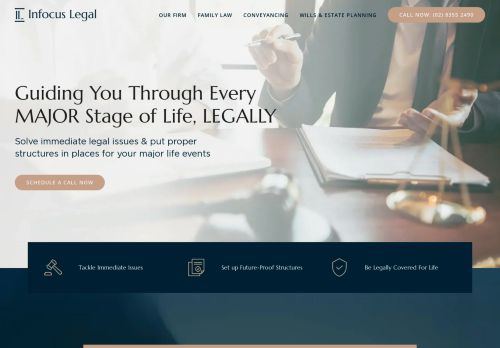InFocus Legal is a small firm that provides big firm results in a prompt and cost-effective manner.
In accordance with the beliefs held by the firm, a team of highly qualified and experienced solicitors has been assembled with an aptitude for assisting clients with managing their affairs – from important family decisions to life’s bigger choices, such as buying or selling property.
In spite of complex and expensive advice you may have been given about the asset protection advantages of holding assets in discretionary trusts, no guarantees should be given that the holding of assets in these discretionary trusts will offer you much protection against future family law claims.
This is brought about mainly by the High Court of Australia’s determinations in Kennon v Spry (2008) 83 ALJR 145; (2008) 251 ALR 257 (the “case”).
Interestingly the husband in this case was actually a barrister who specialises in trusts, notwithstanding that however, the effect of this case is that the Family Court of Australia have the power and the capacity, to see through complex trust structures, in the context of any application before them to make orders in relation to the division of property and financial interests between estranged matrimonial (or de facto) spouses, and include the assets of the trust in their considerations on percentage divisions. The Court have the power to consider a party’s interest in a discretionary trust to be either a financial resource or an actual asset of that party.
Therefore holding assets and property in a discretionary trust or trust structure may not protect these assets from being:
- weighted as a financial resource of a party/or the parties to the relationship/marriage;
- considered an asset of the party, or an asset of the parties of the relationship/marriage; or
- an asset towards which your spouse is considered to have made a contribution towards, by reason of care of a child of the party, or caring for the household of the party, or other financial or non-financial contribution;
in the context of an application by any spouse of yours before the Family Court of Australia.
In this case, at first instance, the Trial Judge applied many case law authorities which support the proposition that an asset in a trust could be treated as property of one of the parties to the marriage if that party demonstrated in fact control over the trust and the ability to benefit from them (In the marriage of Kelly [No 2] (1981) 7 Fam LR 762; In the Marriage of Ashton (1986) 11 Fam LR 457; [1986] FLC 91-779; In the Marriage of Davidson [No 2] (1990) 101 FLR 373; In the Marriage of Goodwin (1990) 101 FLR 386; In the Marriage of Webster (1998) 24 Fam LR 198; [1998] FLC 92-832; JEL v DDF [No 2] (2001) 28 Fam LR 119; [2001] FLC 93-083; In the Marriage of Milankov (2002) 28 Fam LR 514; [2002] FLC 93-095). The Full Family Court by majority upheld the Trial Judge’s determination.
In this case the husband was not a named beneficiary of the trusts in question however as the husband ultimately had complete control over the trusts, including the ability to rescind the trust deed, and reinstate himself as beneficiary. This was a consideration at the trial and at the Full Family Court Level. The High Court ultimately, although taking a different route in their determinations, arrived at the same conclusion and considered the assets of the discretionary trusts in question to be property of the parties to the marriage.






